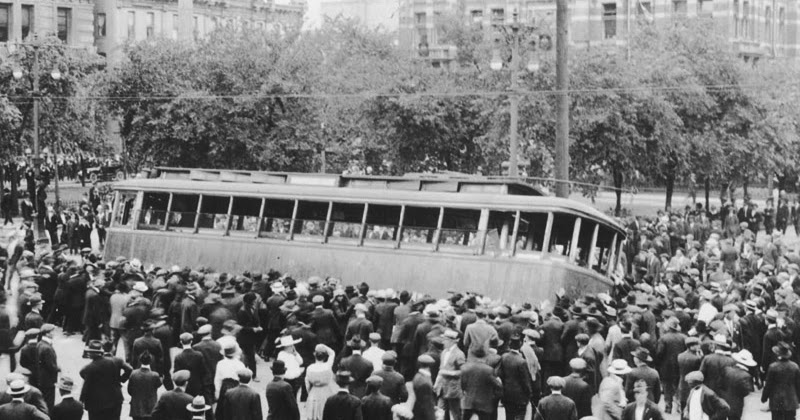1919 The Winnipeg General Strike begins
 There is no doubt that the economic situation in the year following the end of the Great War was not a happy one for the labouring classes of Winnipeg. Prices had risen sharply during the war years of 1914-18, much more sharply than wages. Returning veterans often found it hard to get their old jobs back and were particularly resentful when it seemed that these jobs were now held by immigrants, aliens who had not fought for King and Country. Some discontented veterans turned to anti-foreign bigotry; some turned to more radical politics than they would have espoused before their war experiences.
There is no doubt that the economic situation in the year following the end of the Great War was not a happy one for the labouring classes of Winnipeg. Prices had risen sharply during the war years of 1914-18, much more sharply than wages. Returning veterans often found it hard to get their old jobs back and were particularly resentful when it seemed that these jobs were now held by immigrants, aliens who had not fought for King and Country. Some discontented veterans turned to anti-foreign bigotry; some turned to more radical politics than they would have espoused before their war experiences.
If a Winnipegger in early 1919 were to read one of the numerous newspapers that the city boasted, they would see that the world was on fire. In Russia a full-scale civil war was in progress with murderous armies of Reds, led by V.I. Lenin’s Bolsheviks, and Whites killing and starving miilions. Inspired by Bolshevik successes, soviet revolutions broke out over Europe. On January 5 in Berlin, the left-wing Spartacists led by Rosa Luxembourg and Karl Liebknecht, rose up to establish a communist republic, prompting battles with the right-wing Freikorps. Two days later, anarchists rebelled in Argentina. Two weeks after that, a revolution took place in Portugal, and Irish rebels began a civil war. Over the next few months, there were labour riots in Glasgow necessitating the calling in troops, disturbances in Czecholslovakia, a General Strike was launched in Seattle, Egypt broke out in rebellion, and Canadian troops overseas mutinied on British bases. In Moscow the Comintern was formed to coordinate Marxist rebellions on a global scale; soviet republics were set up in Hungary and Bavaria. Mexico was in the throes of revolution: the rebel Emiliano Zapata was assassinated and Pancho Villa was on a rampage. In Europe, in response to left-wing activism, veterans, such as Adolf Hitler and Benito Mussolini, were creating new fascist parties.
Class tensions and potential violence were not absent from Winnipeg. A well-attended meeting at Winnipeg’s Walker Theatre in December 1918, co-sponsored by the Trades and Labour Council and the Socialist Party of Canada, had heard speakers denounce capitalism, and demand that Canadian troops be withdrawn from the expedition to fight the Reds in Russia. The Chairman, John Queen, then called for three cheers for the Russian Revolution. The meeting ended with deafening cries of “Long live the Russian Soviet Republic! Long live Karl Liebknecht! Long live the working class!” A telegram of congratulations to the Bolsheviks was to be sent. Late in the following month , a mob of returned veterans in Winnipeg attacked socialists mourning the deaths of Luxembourg and Liebknecht, marched on a meat-packing pant to demand that immigrant workers be fired, vandalized businesses, and forced suspected foreigners to kiss the Union Jack.
In March of 1919, the Western Labour Conference opened in Calgary with a large delegation from Manitoba, including men such as R.B. Russell, Andy Scoble, and R.J. Johns who would be involved in the Winnipeg General Strike. Johns was noted back in Winnipeg for opposing conscription and urging a general strike during wartime. The conference called for the formation of One Big Union, the ultimate weapon in the labour arsenal, and the replacement of capitalism with industry controlled by workers’ soviets. Among two of the motions passed unanimously were one placing those present “on record as being in full accord and sympathy with the aims and purposes of the Russian Bolshevik and German Spartacan Revolutions” and accepting “the principle of ‘Proletariat Dictatorship’ as being absolute and efficient for the transformation of capitalistic private property to communal wealth, and that fraternal greetings be sent to the Russian Soviet Government, the Spartacans in Germany, and all definite working class movements in Europe and the world, recognizing they have won first place in the history of the class struggle.” Russell was dispatched back to Winnipeg to carry out “propaganda” on behalf of these resolutions.
National and provincial officials were not unaware of these tensions and were seeking to understand the situation better. The Manitoba government had proposed an Industrial Disputes Commission but the Trades and Labour Council in Winnipeg refused to nominate labour members to it. The Borden government in Ottawa had set up the Mathers Commission (under the Chief Justice of Manitoba) to investigate industrial relations across Canada – but again the TLC refused to cooperate or testify before the commission went it came to Manitoba.
This was the situation on May 15, 1919 when the General Strike was launched – a world in turmoil, Marxist revolutionaries in bloody rebellion, local labour leaders praising Bolshevism, and using the language of class warfare. If the strikers were misunderstood, if the pro-establishment Citizens’ Committee of One Thousand, local newspapers, and the Borden government over-reacted in perceiving revolutionary intent, the Left had nobody to blame but itself.
The strike lasted until late June when it was abandoned in what was seen at the time as a failure, but it lives on in progressive folk memory as a moral victory.